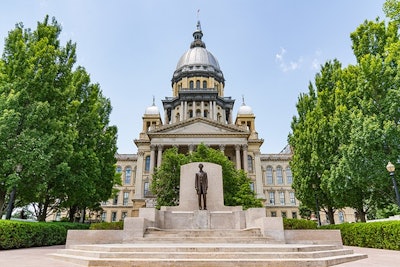
Illinois lawmakers are considering two proposals to legalize adult-use cannabis this year, and according to Chris Lindsey, senior legislative counsel for the Marijuana Policy Project (MPP), discussions on recreational use could spark changes to the state’s medical cannabis program, as well.
State Rep. Carol Ammons (D-Urbana) introduced the first legalization bill of the session, HB0902, on Jan. 25. The legislation would allow licensed businesses to grow and sell cannabis, and residents could grow up to 24 plants at home. On-site consumption areas would also be allowed under the proposal.
State Sen. Heather Steans (D-Chicago) and State Rep. Kelly Cassidy (D-Chicago) plan to formally introduce a more conservative adult-use legalization bill soon—a proposal that is backed by MPP and that has been in the works for the past two years, Lindsey said. It is based on language in SB0007, legislation introduced by Steans in the Senate that lays the foundation for the new proposal.
“It originally started as a fairly general bill in the sense that it covered all of the bases that we usually see in a regulatory system, but it was not really closely tailored to Illinois in particular,” Lindsey said. “That was really just to get the conversation started and to see the areas where people really wanted to focus attention. So, from the time that bill was originally introduced until now, there’s been a pretty concerted effort to go through and track the regulatory framework that Illinois is already familiar with through its medical cannabis program and then design an adult-use law that would be pretty familiar to most people who know how the medical program works.”
That process is nearing completion, Lindsey added, and a bill is expected in the coming weeks.
RELATED: 2019 State Cannabis Legislation: The Bills to Watch
At a town-hall style meeting at the end of January, Steans and Cassidy said their forthcoming legislation would allow adults 21 and older to purchase and possess up to 30 grams of cannabis, as well as grow up to five plants in their homes, according to a State Journal Register report. The bill will also include an expungement provision, which would clear the records of citizens previously convicted of low-level marijuana possession and dealing. Steans and Cassidy also indicated that the measure will direct the estimated $350 to $750 million in annual tax revenue generated from a recreational marijuana program to community development in impoverished neighborhoods.
Although the two bills take different approaches to legalization, Lindsey said one thing is clear: cannabis policy reform is a topic that many of the state’s lawmakers are focusing on this year. With all the attention, there is a good chance that a legalization bill might pass, he added
“Partly it’s because this bill has been under consideration now for a good while,” he said. “There have been numerous hearings on it. There have been many, many meetings that the sponsors have had with their colleagues in both chambers.”
The other encouraging sign comes from Gov. J.B. Pritzker’s support of legalization. “We started to see then-candidate J.B. Pritzker come out very much in support of adult-use, and for him, I think it’s as much a matter of criminal justice reform, which I know he’s really been pretty focused on, but it’s also going to help with the state’s problem with their budget right now,” Lindsey said. (Pritzker won election in November 2018.)
Lindsey’s main objective, regardless of which bill garners enough support to pass, is to see the creation of a functional cannabis market that draws people away from the illicit market. “What we want to see is a program that functions well and provides access to adults in such a way that we can really start to move away from the underground market that currently serves adults in the state,” he said. “That’s really our guiding principle, and from there, we move into particular policy areas.”
And while MPP’s focus is adult-use legalization this year, Lindsey said the medical program could also use some improvements, which he hopes will be set in motion by the broader adult-use conversation.
During last year’s session, lawmakers removed the requirement that medical cannabis patients submit to background checks and fingerprinting, but now, regulations for businesses need some fine-tuning, Lindsey said.
“When Illinois passed its law, it really wanted to set a very high bar for its regulatory framework, and I think that’s to be applauded, but in the process, sometimes you can end up with rules that are pretty hard to work with,” he said. “I think … the issue is, where can we do things that will maintain the high standards that the state’s come to expect, but also get some of these businesses out of some of the requirements, or at least make changes to those requirements so they’re not burdened quite as much?"

























